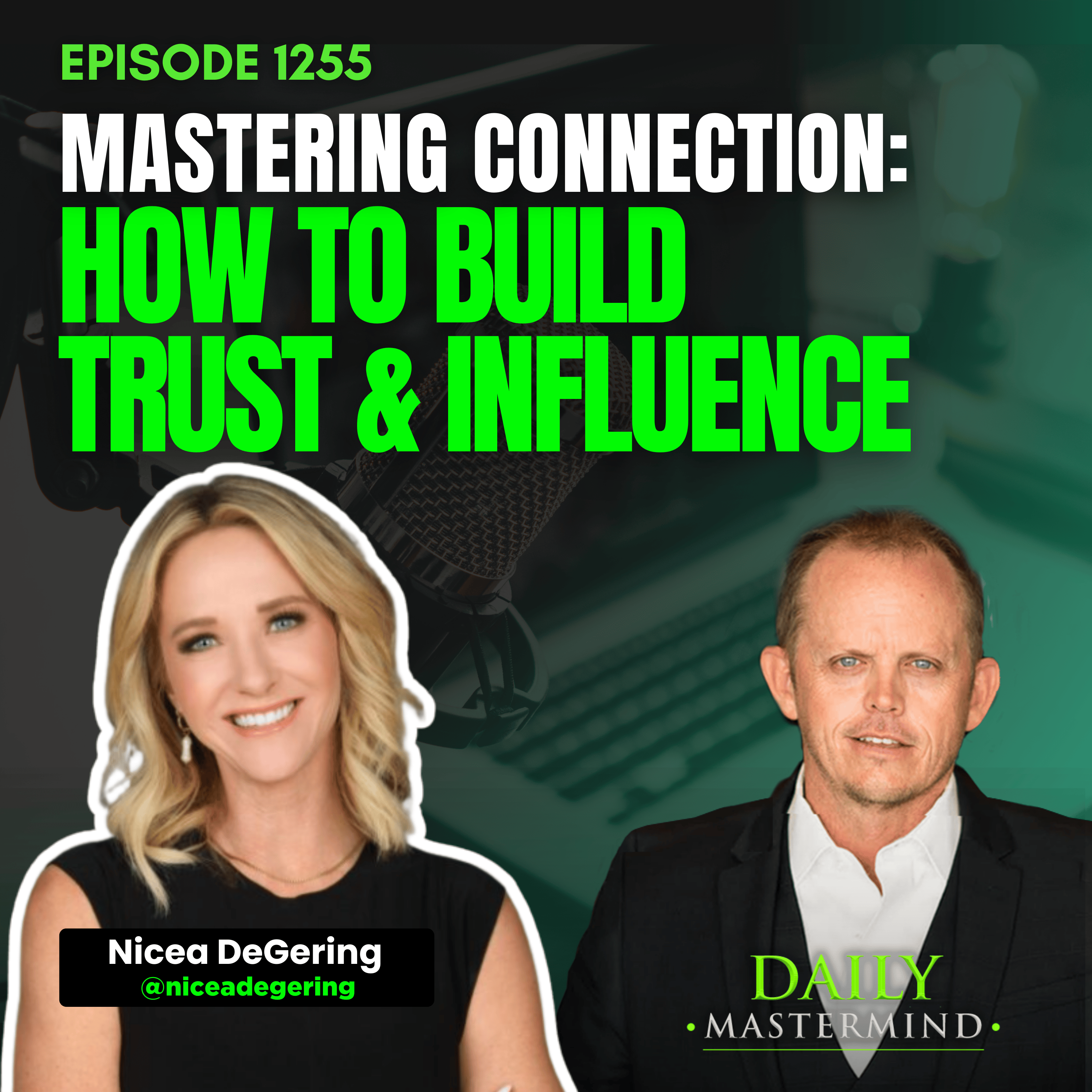
Leadership Insights from a Former Navy Seal, Investor and CEO with Roy Dekel
Today on the podcast let’s talk about Entrepreneurship with a Venture Capitalist, Real Estate Investor and former Israeli Defense Forces Navy Seal Operator. Roy Dekel has been featured in Forbes and Entrepreneur Magazine and share a ton of business knowledge and success that you can apply in your business and life.
Leadership Insights from a Former Navy Seal, Investor and CEO with Roy Dekel
Welcome back to The Daily Mastermind. George Wright III here with your daily dose of inspiration, motivation, and education.
I'm super excited today because we've got another live interview—and I'm introducing you to an incredible thought leader, Roy Deckel. Let me give you a quick background before we jump in. Roy’s an investor, venture capitalist, CEO, philanthropist, top leader, and Navy SEAL. He’s currently CEO of a couple companies, including SetSchedule, a tech platform that connects homeowners with real estate agents. You may have seen him featured in Forbes and Entrepreneur.
We're diving into entrepreneurship, leadership, and maybe even some market economics. Roy, thanks for coming on the podcast. How are you doing?
I'm great. Thanks for having me, George. I appreciate the time.
It’s not always easy to get high-level leaders like yourself when you're running multiple businesses. So I really appreciate it. And look, people see the success, the accolades—but they don’t always realize the struggle behind the scenes.
Roy’s Journey into Entrepreneurship
Let’s rewind a bit. You’ve got a background in the military as a Navy SEAL, and now you’re a multi-company CEO. Did you grow up around entrepreneurship, or what originally pulled you into business?
That's a great question. Thanks for that. I was born and raised in Israel, in a very humble area. Honestly, “humble” is putting it nicely. There weren’t many opportunities—certainly not much entrepreneurship.
Eventually, I volunteered for field training and entered the Navy. Military service is mandatory in Israel, but joining special operations is voluntary—and I chose that path. I also went through the Officers Academy, and that experience really shaped me.
I realized I loved molding people and building teams. And I also enjoyed becoming the system—the person creating new processes, making decisions, and driving things forward. It was mostly in the military domain at the time, but I loved it.
My mom always worked for someone else, but my dad was a serial entrepreneur. He struggled a lot in a small ecosystem, so I saw both sides. But in the military, I found that I thrived on building systems and people. When I moved to the U.S.—basically by chance after meeting my wife in Los Angeles—I discovered that I loved solving problems, building companies, and shaping organizations. That’s how I got into entrepreneurship.
Bringing Military Discipline to Business
That’s powerful. And I’ve heard similar things from other high-performing military leaders—the systems and structure they bring with them into business. So tell me, have you brought those specific military processes into your companies, or was it more of a mindset shift?
Absolutely. I’ve had both successes and failures in business, but one thing that always stuck was my belief in structure. I know we like to criticize government agencies or systems like the DMV, but they actually operate with some of the most defined processes—and that includes the military.
The military is, in many ways, the largest “company” in any country. So I adapted that structure into my business: the process of creating checks, audits, systems, and repeatable workflows. That’s how I approach company-building.
I love that insight. And you’re right—the military doesn’t just create top-down processes. They empower leaders at every level through clear systems and defined expectations. Are there any stories or lessons that really stand out from your military days—something you still use today?
Definitely. One of the most impactful was going through Hell Week. If you’ve heard of it, you know it’s exactly what the name implies—pure hell. In the Israeli Navy SEAL training, we did it twice.
During Hell Week, people break. They cry. They question why they’re even there. But you also see people carry each other. You see leaders emerge. And that directly parallels business. In a startup, there are going to be “hell days” and “hell weeks.” I flip the switch in my mind and say, “This is just a tough day. I’ll push through.”
Another process we had was an immediate post-operation review. After a training or mission—often after two days without sleep—we sat down for a mandatory debrief. Everyone, regardless of rank, would share what went wrong, what could be improved, and we had to walk away with five key lessons every single time. That’s business 101: you grow through learning from the field, not avoiding tough conversations.
Building Culture Through Systems and Leadership
That’s such a great example. I love how you said when you realize it’s just a tough moment—not your whole life—you can shift into problem-solving mode. That awareness is so powerful. But I also really respect that you don’t just move on from hard moments—you force a process of learning.
So, let me ask you this: how do you take something like that and make it part of your business culture without people just brushing it off as a “CEO thing”? Is there a way to make that part of the DNA of a company?
That’s a multilayered question—but a great one. Building culture is the single hardest part of business. It’s also the most important. Whether it’s love, trust, or clarity of purpose, your team has to understand the “why.” Why are they doing what they’re doing? Why does this KPI matter? Why are they getting feedback or recognition?
Culture is hard—but never optional. And to make it work, I implement what I call a 360° approach. Every starting point needs an endpoint, and it has to be repeatable. Most breakdowns in business happen at the people level—when someone loses motivation, misinterprets the situation, or just checks out.
The 360° system starts with task creation, moves through execution, includes auditing and review, and ends with continuous improvement. But none of that matters unless people understand the why. If your team believes in the mission and sees the logic, the system becomes part of the culture.
The Role of People in Scaling a Business
I love that. And you’re right—culture is what creates scalability. I’ve always believed that businesses scale through people, not just processes.
But you can't scale people without systems in place. Strategy gets you started, marketing and growth help you scale—but the real lift comes when the people around you are aligned. And that starts with repeatable systems that are people-proof but still people-powered.
Exactly. That’s why if you try to build a business without systems, it’s not a business—it’s a hobby. And hobbies are expensive.
So true. Hobbies burn time and money—and they don’t scale.
What’s Next: Real Estate, Tech, and Community
Let’s shift gears a bit. I know you’re involved with SetSchedule and Rentastic, both of which are doing some exciting things. What’s your main focus right now? What’s on the horizon for you and your companies?
At a high level, my personal “why” is helping entrepreneurs. That’s what drives me. But on the business side, our companies are all about making life easier for solopreneurs and entrepreneurs—especially in the real estate space.
SetSchedule is like a better version of LinkedIn for real estate professionals. Or, think of it as a smarter Yelp for agents, brokers, and mortgage pros. Our focus is to create the largest real estate professional network in the U.S., where agents, investors, and brokers can connect, network, and close deals.
Rentastic, on the other hand, is a financial software platform for real estate investors. It helps users track expenses, sync bank accounts, manage income, and more. So the next 12 months are about merging these two ecosystems—giving professionals a better way to manage, grow, and succeed.
That’s a huge opportunity. And I love that you’re not just building tools—you’re solving real problems. You’re creating a community, not just a piece of software. And let’s be honest: when someone like you decides to go all-in on a market, it’s worth paying attention.
So what’s your take on where the market is headed—especially in real estate? There’s so much uncertainty, but you seem pretty optimistic.
We don’t have time to get into all the data we track, but I’ll say this: population growth in the U.S. is not slowing down. Immigration, demographic shifts, and economic demand all point to continued growth. And we’re not making more land.
Add to that my natural tendency to be a contrarian—I don’t follow the crowd. I believe in the American dream. I believe the next 24 months are going to be one of the most exciting times in real estate.
Advice for Entrepreneurs
You’ve got a big-picture view of business, leadership, and markets. What advice would you give entrepreneurs right now—whether they’re just starting out or they’re in the trenches trying to scale?
Here are my top three pieces of advice:
First, tune out the naysayers. That includes the so-called professional advisors and critics who always have something to say. Especially when times are tough, you’ve got to silence that noise.
Second, be a contrarian. If everyone’s moving one direction, at least ask yourself if there’s another way. Look at the opposite angle. That’s where the opportunities usually are.
And third—don’t forget your why. When things get messy—and they will—you’ve got to remind yourself why you started. That vision you had when you launched your business? That’s your anchor. Rainy days are inevitable. But greed and growth always overpower fear. Just remind yourself: it’s a Hell Week… not a Hell Month. You’ll get through it.
That’s powerful advice. Especially that last one—your “why” can help you weather anything. And being a contrarian is something I think more entrepreneurs need to lean into. Following the herd rarely creates innovation.
How to Connect
Before we close, where’s the best place for people to connect with you, ask questions, or learn more about your companies?
LinkedIn is a great place. I’m very active there, and I always check my DMs. Twitter is also a place where I engage more conversationally.
As for the businesses—SetSchedule.com and Rentastic.ai. If they help you, just use them. If you want to manage your deals, expenses, or network more effectively, that’s what they’re there for.
That’s great. I’ll make sure we link everything in the show notes. And for everyone listening—success always leaves clues. You’ve heard how Roy thinks, how he builds systems, how he scales. There’s a lot to take away here, and I hope you do.
Final Thoughts
As always, I want to remind you: It’s never too late to start living the life you were meant to live. Whether you’re building a new business, restarting, or just refining your path, stay consistent, stay focused—and stay connected to your “why.”
If you got value from this episode, do me a favor—share it with a friend and tag us on social media @thedailymastermind. And until next time, this is George Wright III—thanks for listening.
Guest Resources & Links
Connect with Roy Deckel and explore his work:
🔗 LinkedIn: Roy Deckel on LinkedIn
🐦 Twitter/X: @RoyDeckel
🌐 Website – SetSchedule: https://www.setschedule.com
📊 Website – Rentastic: https://www.rentastic.ai

.png)
.png)

